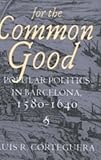For the Common Good : Popular Politics in Barcelona, 1580–1640 / Luis R. Corteguera.
Material type: TextPublisher: Ithaca, NY : Cornell University Press, [2018]Copyright date: ©2002Description: 1 online resource (256 p.) : 3 charts/graphs, 7 halftones, 3 tablesContent type:
TextPublisher: Ithaca, NY : Cornell University Press, [2018]Copyright date: ©2002Description: 1 online resource (256 p.) : 3 charts/graphs, 7 halftones, 3 tablesContent type: - 9781501723544
- 946/.7204 21
- DP402.B29 C67 2002
- online - DeGruyter
| Item type | Current library | Call number | URL | Status | Notes | Barcode | |
|---|---|---|---|---|---|---|---|
 eBook
eBook
|
Biblioteca "Angelicum" Pont. Univ. S.Tommaso d'Aquino Nuvola online | online - DeGruyter (Browse shelf(Opens below)) | Online access | Not for loan (Accesso limitato) | Accesso per gli utenti autorizzati / Access for authorized users | (dgr)9781501723544 |
Frontmatter -- Contents -- Illustrations -- Preface -- Abbreviations -- 1. Artisans in Politics -- 2. For the Common Good of Barcelona -- 3. Who Speaks for the People of Barcelona? -- 4. Taking Politics to the Streets -- 5. The Future of Privilege -- 6. Demand for Justice -- 7. Refusing to Fight -- 8. The Monster Unbound -- Conclusion -- Appendix 1. Trades and Crafts in Barcelona -- Appendix 2. Artisan Representation in Barcelona's Consell de Cent -- Appendix 3. Officers in the Confratemity of Master Shoemakers -- Glossary -- Bibliography -- Index
restricted access online access with authorization star
http://purl.org/coar/access_right/c_16ec
On June 7, 1640, the viceroy of Catalonia was stabbed to death on a Barcelona beach. By Christmas, several more royal officials of the Spanish principality had been assassinated. In the wake of these and other violent acts committed by the "people"—a term used for artisans—the Catalans severed their allegiance to the Spanish monarchy and elected Louis XIII of France their new king. The first English-language book to explore the political beliefs and behavior of early modern craftsmen, Luis Corteguera's work offers a dramatically new account of the origins of the Catalan revolt, the longest rebellion in seventeenth-century Spain.Drawing on his extensive research in Barcelona's archives, Corteguera examines how the political actions, ideas, and language of Barcelona's craftsmen shaped the relations between the Spanish monarchy and Catalonia in the decades leading to the insurrection. Artisans made up over half of the population of Barcelona, the political center and largest city of Catalonia. The Mediterranean port had a long history of active popular politics. Artisans sat in the city council, formed the core of the principality's largest militia, and participated in protests and riots. Corteguera finds that the 1640 rebellion was not a social revolution of the poor but rather a political action by craftsmen seeking to defend what they perceived as the ancient liberties of their homeland. Although their behavior was more violent, the artisans were, the author asserts, motivated by the same assumptions, language, and symbols that inspired the elite of the principality.
Mode of access: Internet via World Wide Web.
In English.
Description based on online resource; title from PDF title page (publisher's Web site, viewed 26. Apr 2024)


